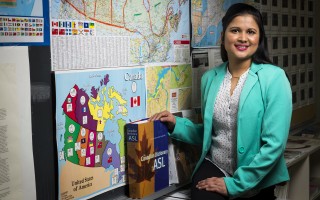Architect. Husband. Builder.
“We have been running all our lives”.
Tahir, 43 years old: “When I learned about the Parthenon as a young man, I never imagined I would ever live in Greece. However, preserving its cultural heritage ended up being my life’s mission. I have worked on marble, stone and plaster since I was 13, the year my parents smuggled me to Tehran to save me from the fighting in Afghanistan.
After coming to Athens, I built my family’s home almost from scratch. Everywhere under the meandering moulding, my wife Sardor has hung up pictures of our three sons. Our leafy back yard is our favourite refuge. Sipping juice from our lemon tree and listening to our birds sing, we gather, chat and host the good neighbours with whom we have been blessed. That’s my family’s sanctuary, so dear to my wife! ‘We have been running all our lives,’ she used to say, ‘we need a place where we belong; a place from which they cannot chase us- a place to say, this is where we come from’.
I did my best to give that to her and that’s my dream for every Afghan family that arrives in Greece. At the Afghan community centre, where I spend all my spare time, I provide guidance and practical support to newcomers. Crisis-ridden Greece is a not an easy place to establish roots. But I keep trying for the rapprochement of my Greek and Afghan homelands.”
As a teenager in Iran, Tahir worked in a marble workshop by day and attended school by night. He discovered he had a natural talent and followed courses at the School of Architecture in Tehran. He specialized in Greek, Russian and Italian architecture, and constructed houses in Iran and Dubai. He tried to return to Afghanistan twice, but he couldn’t stay due to the war. His desire to receive legal refugee status led him to Greece, where his family joined him six years later. In Athens, he looked for a job as a building restoration worker. One morning in 2004 he was outside the National Technical University of Athens, where a large renovation project was about to start. He walked up to one of the engineers and asked for work. Hesitantly the engineer asked for a sample to compare with other offers. “Surrounded by architects and engineers, I began making models and plans,” Tahir recalls. “At some point, the foremen came around and asked me where I was from, ‘That’s settled then!’, they exclaimed. ‘Let the Afghan work on everything!’, they told me jokingly. Today, I’m very proud of this work!”
Today Tahir has legal worker status – after a mass regularisation of foreign workers, and his wife Sardor has refugee status.
Refugees. Ordinary people living through extraordinary times. Share their stories.
Like Tahir’s family, who came to Greece via Iran and Turkey, tens of thousands of refugees and migrants have arrived by sea to Greece. The country has seen a dramatic increase in the numbers in recent years; between January – May 2015, there were some 38,000 arrivals by sea, marking an increase of more than 400%, in comparison with the same period in 2014. UNHCR provides the new arrivals information on rights and obligations, interpretation services and basic relief items.
MORE STORIES
Ibrahim – English student. Brother. Footballer.
“I am alive thanks to my sister.”
Pabi – Interpreter. Sister. Fashionista.
“I spent 17 years in a refugee camp”.
Trésor – Storyteller. Son. Hip Hop Artist.
“I felt threatened and escaped to Malawi.”







